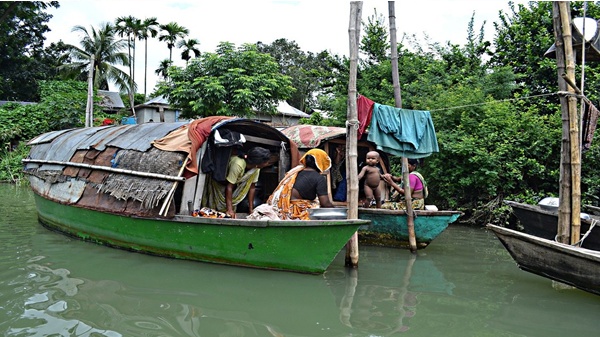River Gypsies in Bangladesh
River Gypsies in Bangladesh [330 Words]
River gypsies, locally known as Bede or Manta, are a unique nomadic community in Bangladesh who live their lives on boats and travel from one place to another along rivers. These people have a long tradition of living close to water, depending on rivers for their livelihood, shelter, and identity. Their boats serve as both homes and transportation, and their lifestyle is deeply connected to the ebb and flow of river life. The river gypsies earn their living in various traditional ways. Some catch and sell fish, while others entertain villagers with snake charming, monkey shows, magic tricks, or traditional medicines. Many of them also sell small household items in rural markets. Women often engage in fortune-telling and herbal healing practices. Despite their resourcefulness, river gypsies face many hardships due to poverty, lack of education, and social exclusion. One of the major challenges they face is the seasonal change of water levels. During the dry season, they are often forced to anchor on dry riverbeds, making survival difficult. In the monsoon, floods can damage their boats and force them to move constantly. They rarely have access to basic services like education, healthcare, or proper sanitation. Most children in river gypsy families do not attend school, which continues the cycle of poverty and illiteracy. In recent years, the traditional lifestyle of river gypsies has been under threat due to river erosion, pollution, and modernization. Many are being forced to settle on land and abandon their nomadic way of life. Although some NGOs and government programs have attempted to improve their conditions by offering education and alternative livelihoods, much more needs to be done to integrate them into mainstream society while preserving their cultural heritage. River gypsies are a colorful and resilient part of Bangladesh’s cultural fabric. Their way of life, though fading, reflects a deep connection with nature and a spirit of survival. Protecting their rights and traditions is important for preserving the rich diversity of the country.
River Gypsies in Bangladesh [280 Words]
River gypsies in Bangladesh, known locally as Bedey, are an ethnic group leading a nomadic life on boats, traveling between rivers and the mainland depending on the season. Traditionally, they earn a living by catching snakes, performing snake charming, and selling herbal medicines, amulets, and trinkets. However, increasing urbanization, shrinking waterways due to climate change, and the need for formal education are creating challenges for this community. The government is providing support like housing and loans, and mobile boat schools are being established to educate their children. The gypsies have their own lifestyle and culture. They live in groups and do not own any land. Therefore, they live a nomadic life, travelling from one place to another. These people roam across our rivers and waters from May to December in small country boats. These boats are their houses and these people are a part of our waters. In winter, many water bodies dry up. At that time they return to the mainland and live in make-shift tarpaulin tents on open river banks. You can see their men relaxing in the tents. Toddlers play with dogs or other pets in the dust. Women often idle away time by hair doing, picking off lice in twos or threes sitting in a row. Throughout the monsoon, they remain busy with fishing. They also dive for natural pearls in waters. Sometimes, they camp for a couple of weeks. Men catch snakes and entertain people with snake charming and sell herbal cures. Women go from door to door to sell bangles, cosmetics and other things. They also try to heal pains of old people often by sucking out blood from their body.

